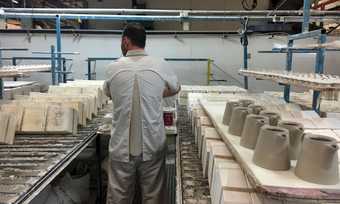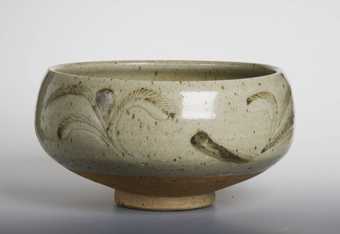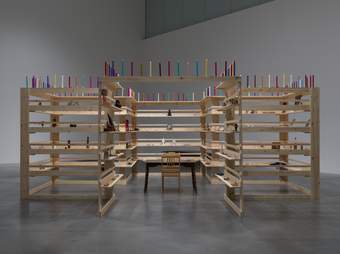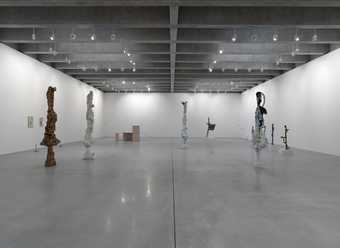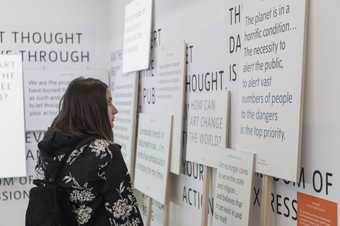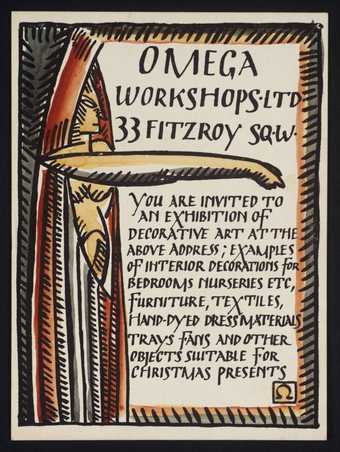Artist Clare Twomey transforms Tate Exchange into a factory making everyday objects from clay to explore ideas around the concept of production.
Week one
A 30-metre production line, forty factory staff, eight tonnes of clay, a wall of drying racks, and over 2,000 fired clay objects will occupy the floor of Tate Exchange. You can clock in, join the production line and learn the skills of working with clay. You will be able to exchange what you make for another person’s tea pot, jug or flower from the factory.
Week two:The Redundant Factory
Thursday 5 October to Sunday 8 October 2017
The production line stops, the workers have left and you will enter a factory soundscape. The now redundant factory becomes a space for questions. Talks from industry specialists, researchers and makers will explore how communities are built by collective labour, look at where the industrial processes of our past are informing our future and consider what we will need from factories in years to come.
Cards placed throughout the factory floor invite you to think about raw materials, how knowledge is acquired and shared, where transformation takes place and the different systems of value we apply to material culture and human relationships. Leave your thoughts and share where production exists for you in exchange for an object made in the factory.
All activities are FREE and drop-in.
Talks Programme
Thursday – Material and Knowledge
14.00–15.00: Kevin Brassington (Dudson) and Steven Brown (Dudson), chaired by Clare Twomey
15.30–16.30: Phillippa Norcup (ceramic flower maker) and Jean Gleave (ceramic flower maker), chaired by Emily Stone (Tate)
17.00–17.45: Amanda Briggs-Good (digital textile design), chaired by Madeleine Keep (Tate)
Friday – Material and Knowledge
14.00–15.30: George Nicholson (local historian) and Daniela Couling (local historian, chaired by Clare Twomey
16.00–17.30: Freya Bramble Carter (ceramicist)
Saturday – Transformation and Value
14.15–15.15: Roger Kneebone (surgeon) in conversation with Clare Twomey
15.30–16.30: Derek Frampton (taxidermist), Isidro Tomas (veterinary surgeon) and Tamzin Cuming (colorectal surgeon), chaired by Roger Kneebone
16.45–17.45: Rachael Matthews (textile artist) and Fleur Oakes (three-dimensional embroiderer), chaired by Roger Kneebone
Sunday – Transformation and Value
14.00–15.00: Emily Thorn (Aestheticodes)
15.30–17.00: Robin Wilson (material culture and visual anthropology, University of Oxford), chaired by Louise Purbrick (History of Art and Design, University of Brighton)
About Clare Twomey
Clare Twomey is an artist based in London whose work often involves intense research, focusing on themes such as collaboration in fabrication. She has an MA in Ceramics and Glass from the Royal College of Art and is Reader in the School of Media, Arts and Design at the University of Westminster where she directs Ceramics Research in The Centre for Research and Education in Arts and Media (CREAM).
Tate Exchange: Production is supported by Maryam and Edward Eisler, Red Hat Inc., Paul Hamlyn Foundation and Art Fund. FACTORY: the seen and the unseen has received additional support from Dudson, the University of Westminster, the University of Nottingham and the British Ceramic Biennial.
Artist statement
A factory is a term that refers to shared labour, where the production line is composed of many parts and processes and through shared goals a product is completed. I have spent years in ceramics factories understanding how they function, how human they are, how they make the things we want. The factory I have built for Tate Exchange is not a real factory, it is not a real place of work, it is a place of simulation with the intent to draw us into a conversation about how we connect to our everyday ideas of labour, value and exchange.
When the factory is live it will draw us into its rhythm of the tasks of labour, the enchantments of handling materials, the languages of labour, skills and craft in repetition and the development of knowledge.
In the redundant FACTORY the workers have gone but their voice and breath remain. The machines, the materials, the benches become small monuments. The space is filled with the evidence of the human, but the wholeness of the factory is fractured, a space now exists where the human is craved, the purpose of the factory has become a proposition of both loss and potential. The tasks of labour are now listening, reflecting, observing. The visitor is invited to and consider their own relationship to and experience of production.
Factory: The Seen and the Unseen is curated by Madeleine Keep, Curator, Public Programmes and Emily Stone, Assistant Curator, Public Programmes.

